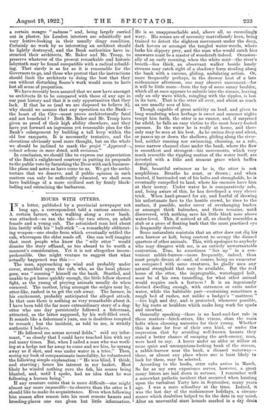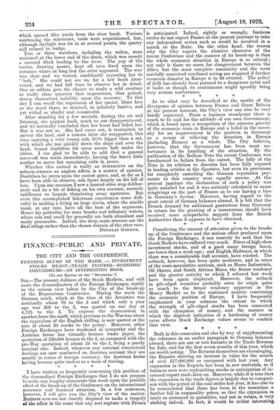HOURS WITH OTTERS.
IN a letter, published by a provincial newspaper not long ago, a correspondent told .a curious anecdote. A certain farmer, when walking along a river bank, was attacked—so ran the tale—by two otters, an adult female and a young cub. The astonished man laid about him lustily with his " bull-stick "—a remarkably obliterat- ing weapon—one stroke from which eventually settled the cub, whereupon the elder made off. One can well imagine that most people who know the " wily otter " would dismiss the story offhand, as too absurd to be worth a moment's consideration. Yet it is not altogether incom- prehensible. One might venture to suggest that what actually happened was this :- The man, approaching up wind and probably under cover, stumbled upon the cub, who, as the local phrase goes, was " sunning " himself on the bank. Startled, and unable to get home quickly enough, the little fellow showed fight, as the young of preying animals usually do when cornered. The mother, lying amongst the sedges near by, otter-like, rushed in to get the cub away. The farmer, in his excitement, probably anticipated the alleged attack. In that case there is nothing so very remarkable about it. I have been told the far more extraordinary story of a dog- otter who one day persistently followed a fisherman, attracted, as the latter supposed, by his well-filled creel. It sounds like a fisherman's yarn, one is doubtless tempted to remark ; but the incident, as told to me, is strictly authentic I believe.
" He followed me across several fields," said my infor- mant, " so closely that I could have touched him with my rod many times. But, when I called a man who was work- ing at a hedge not far away to come and see him, he sprang away as if shot, and was under water in a trice." Then, seeing my look of compassionate incredulity, he volunteered the following simple explanation : " He was blind, I think, and starving ; hence. his interest in my basket. Most likely he winded nothing save the fish, his senses being blunted, and, until I spoke, had no idea that he was following a human being." If any creature exists that is more difficult—one might almost say more impossible—to observe than the otter is I should like to make its acquaintance. Even when following him season after season into his most remote haunts and breeding-places one can glean but little information. He is so unapproachable and, above all, so exceedingly wary. His senses are of necessity marvellously keen, being trained to detect the slightest movement under the deep, dark hovers or amongst the tangled water-weeds, where lurks his slippery prey, and the man who would catch him unawares must be a master of woodcraft indeed. Occasion- ally of an early morning, when the white mist—the river's breath—lies thick, an observant walker beside lonely streams may catch sight of a shadowy form stealing along the bank with a curious, gliding, undulating action. Or, more frequently perhaps, in the drowsy heat of a late midsummer afternoon, one may observe movement—for it will be little more—from the top of some sunny boulder, which all at once appears to subside into the stream, leaving only an oily wave which, mingling with the ripples, is lost in its turn. That is the otter all over, and about as much as one usually sees of him.
Though capable of great activity on land, and given to long wandering when herbage is sweet and summer nights tempt him forth, the otter is no runner, and, if surprised far afield, he falls an easy victim to the most heavy-footed pursuer. In the water he is really at home, and there only may be seen at his best. As he swims deep and silent, or passes up or down the shallows, gliding along the river- bed, neither running nor swimming, choosing, as a rule, some narrow channel close under the bank, where the flow is smoothest and strongest—his movements, which very much resemble the rippling motion of the water itself, are invested with a lithe and sinuous grace which baffles description.
But, beautiful swimmer as he is, the otter is not amphibious. Breathe he must, or drown ; and when hunted, if barricaded out of his holts and strongholds, he is eventually compelled to land, where his enemies have him at their mercy. Under water he is comparatively safe, and, being aware of this, he has developed a very clever trick. When hard-pressed for air, and fearful of showing his unfortunate face to the hostile crowd, he rises to the surface, if possible, under cover of overhanging bushes or amongst thick bulrushes, and there remains, until discovered, with nothing save his little black nose above water-level. This, if noticed at all, so closely resembles a stub or a piece of floating bark that the most practised eye is frequently deceived. Some naturalists maintain that an otter does not dig his own burrow or holt, being content to occupy the disused quarters of other animals. This, with apologies to anybody who may disagree with me, is an entirely unwarrantable contention. True, he sometimes " lies up " in a con- venient rabbit-burrow--more frequently, indeed, than most people dream of—and, of course, being no excavator as comparei. with some creatures, he gladly uses any natural stronghold that may be available. But the real home of the otter, the impregnable, waterlogged holt, must be of his own tunnelling, for what other animal would require such a fastness 1 It is an ingeniously devised dwelling enough, with entrances or exits under water, while the habitable part—containing sometimes a rough bed of rushes, not unlike a badger's " mattress " —lies high and dry, and is protected, whenever possible, by big roots or boulders which make long work for spade and crowbar.
Generally speaking—there is no hard-and-fast rule in these matters—bitch-otters, like vixens, shun the main holts when choosing nurseries for their young. Whether this is done for fear of their own kind, or under the impression that by avoiding well-known haunts they stand a better chance of escaping the arch-enemy, man, were hard to say. A hover under an alder or willow at some quiet and unsuspicious-looking bank of the stream, a rabbit-burrow near the bank, a disused waterway— these, or almost any place where one is least likely to look for them, may be selected. According to the books, otter cubs arrive in March. So far as my own experience serves, however, a great many litters are laid down in autumn. I remember well a somewhat pathetic incident that occurred. when hunting upon the turbulent Yarty late in September, many years ago. I was a mere schoolboy at the time. Indeed, it was the last day of the midsummer holidays, a circum- stance which doubtless helped to fix the date in my mind. After an uneventful start hounds marked in a dry drain which opened fifty yards from the river bank. Terriers confirming the statement, tools were requisitioned, but, although daylight was let in at several points, the quarry still refused to budge.
Two or three watchers, including the writer, were stationed at the lower end of the drain, which was merely a covered ditch leading to the river. The yap of the terrier, drawing nearer, kept all eyes fixed upon the entrance, where at long last the otter appeared. The way was clear and we waited, confidently expecting her to " bolt." She could not see us, for a low bank inter- vened, and we had full time to observe her in detail. One so seldom gets the chance to study a wild creature at really close quarters that impressions, thus gained, stamp themselves indelibly upon the memory. To this day I can recall the expression of her quaint, blunt face as she stood there, so strained, so infinitely furtive, and yet withal so plucky and resourceful. After standing for a few seconds, flairing the air and listening, she popped back, much to our disappointment, and we naturally concluded that her heart had failed her. But it was not so. She had come out, it transpired, to survey the land, and a minute later she reappeared, this time carrying a very young cub, little bigger than a rat, with which she ran quickly down the slope and over the bank, bound doubtless for some secure holt under the alders. I am glad to be able to add that a general move-off was made immediately, leaving the brave little mother to move her remaining cubs in peace. Whether this animal is really as destructive on the salmon-streams as anglers affirm is a matter of opinion. Doubtless he preys upon the easiest game, and, so far as I have been able to observe, eels figure largely on his bill of fare. Upon one occasion I saw a hunted otter stop deliber- ately and do a bit of fishing on his own account, serenely indifferent to hounds thundering away upstream. But even this accomplished fisherman experiences some diffi- culty in making a living on large rivers, where the nimble trout, at any rate, have all the best of the argument. Hence his partiality for mere brooks and tributary waters, where eels and small fry generally are both abundant and easily procurable. Indeed, the deep, main streams are the final refuge rather than the chosen domain of the otter race.
DOUGLAS GORDON.



































 Previous page
Previous page